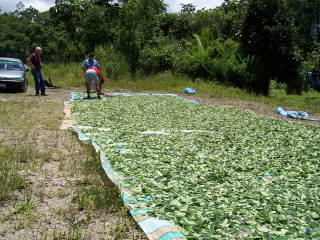The Bolivian government announced Tuesday a new plan to confront the expansion of coca farming in national parks and areas protected under national law. Under the plan, aimed at growers in the traditional coca-producing Yungas area near La Paz, local coca grower unions will be responsible for ensuring that production does not spread.

The government of President Evo Morales, a former coca grower himself, has made progress in reducing conflict between coca growers and the government in the Chapare, his native region, but tensions have been rising in the Yungas. While Morales has expanded the amount of coca that can be grown in the Chapare, that has not been the case in the Yungas.
Under Morales' "coca, yes; cocaine, no" policy, the Bolivian government is seeking to end forced eradication of coca crops and replace it with "rationalization," or negotiated eradication of excess crops. The idea is to reduce social conflict by bringing coca growers into the decision-making process rather than imposing eradication on them.
"The farmers' unions, as the smallest units of social organization in the tropics of Cochabamba (Chapare) and the Yungas of La Paz, assume direct responsibility for preventing the cultivation of coca leaf in fields that have been abandoned by their owners for more than two years," said the proposal from the Deputy Minister of Social Defense and Controlled Substances, Felipe Caceres.
The plan also includes marketing the coca crop for licit uses and support for interdiction work aimed at disrupting the cocaine traffic.
This work by StoptheDrugWar.org is licensed under Creative Commons Attribution-ShareAlike 4.0 International
Comments
A step in the wrong direction
We should be moving to end the entire "war on drugs".
Add new comment